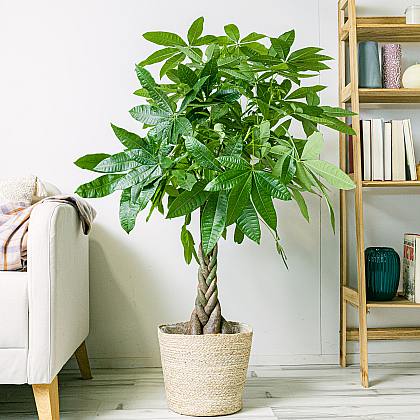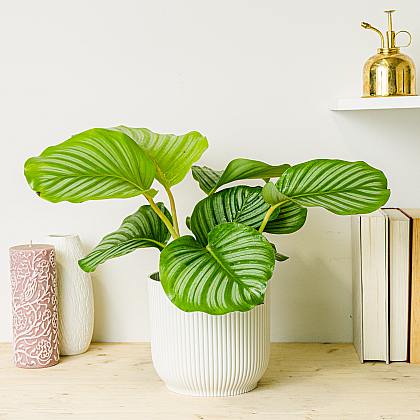Bonsai: an original and charming option to give as a gift to someone with a small living room
Bonsai is a unique form of art that has captivated people all over the world. These small living works have the ability to transform any space, especially those with size limitations, such as small living rooms
Bonsai is a unique form of art that has captivated people all over the world. These small living works have the ability to transform any space, especially those with size limitations, such as small living rooms. In this article, we'll explore the magic and meaning of bonsai, as well as tips for their care and maintenance. We will also discover the stunning floral and fruity designs that can adorn our homes. In addition, we will immerse ourselves in the diversity of styles and designs that exist in the art of bonsai. Finally, we will reflect on the sentimental and lasting value that a bonsai can have as a gift. Get ready to delve into the fascinating world of bonsai and discover why they make a lovely gift for small salons.
The Magic of Bonsai: Small Living Works of Art
Bonsai trees are small living works of art that captivate with their magic and charm. These tiny depictions of miniature trees have been cultivated and shaped over centuries to create a unique and fascinating aesthetic. The magic of bonsai lies in their ability to evoke the grandeur of nature in a small space, carrying with them the essence and energy of full-sized trees. Each bonsai is an expression of patience, dedication, and skill on the part of the grower, who seeks to capture the beauty and natural balance in every detail. Contemplating a bonsai transports us to serene and lush landscapes, allowing us to connect with nature and find inner peace. These small living works of art also teach us lessons about impermanence and the importance of caring for and nurturing what we hold dear. In short, bonsai are much more than just potted plants; They are symbols of beauty, harmony and perseverance that invite us to appreciate the greatness of nature in its tiniest form.
The Meaning and Symbolism of Bonsai
Bonsai are not just small potted plants, but they also have great meaning and symbolism in Eastern culture. Miniature trees represent the beauty of nature and the harmony between man and his environment. Each species of bonsai has a different meaning, for example, the pine tree represents longevity and wisdom, while the cherry tree symbolizes the ephemeral beauty and transience of life. In addition, bonsai are a reflection of Zen thought and its philosophy of living in the present. The practice of bonsai cultivation is a form of meditation that requires patience and concentration to shape the branches and leaves of trees, which helps calm the mind and reduce stress. In Japan, bonsai have traditionally been used to decorate temples and shrines, as well as to give as gifts to friends and family as a symbol of friendship and respect. Bonsai have also been used in Japanese tea ceremonies to create a serene and natural environment. In short, bonsai are much more than just potted plants; They are an artistic and cultural expression that symbolizes the beauty of nature, Zen philosophy and the harmony between man and his environment.
Care & Maintenance: Tips for Raising a Bonsai
Caring for and maintaining a bonsai tree may seem like a difficult task, but with proper care, it is possible to raise a healthy and beautiful miniature tree. The first thing to consider is watering: water is essential for the life of the bonsai, but excess moisture can be harmful. It is important to water the tree regularly, but without waterlogging. Also, you need to pay attention to the amount of light the bonsai receives, as each species has different needs. It is essential to place it in a place where it can receive enough sunlight, but without being exposed to extreme temperatures. It is also necessary to prune the bonsai on a regular basis, both to maintain its shape and to avoid diseases or pests. Finally, the tree should be fertilized with specific fertilizers for bonsai, following the manufacturer's instructions and avoiding overfeeding it. With these basic cares, anyone can raise a bonsai tree and enjoy its natural beauty in their home. However, it is important to remember that each species of bonsai has specific needs and may require additional care. Therefore, it is advisable to research the species of bonsai you want to breed and look for detailed information about its care and maintenance needs.
Floral Bonsai: An Explosion of Colors in Small Spaces
Floral bonsai trees are a perfect choice for those looking to add a pop of color to their small spaces. These small miniature trees are designed to grow flowers, giving a burst of color and life to any home. Some of the most common types of floral bonsai include jasmine, rose, and cherry blossom. Each of them offers a unique range of colors and scents that can transform any room into a welcoming and lively space. To maintain a healthy floral bonsai, it is important to provide it with the right amount of water, light, and nutrients. It is advisable to water them frequently and place them in a place where they can receive enough direct sunlight. In addition, it is important to regularly prune the bonsai to maintain its shape and stimulate flower growth. Floral bonsai trees are a great way to add color and life to any home, especially those with tight spaces. In addition, they are an excellent choice for those who enjoy the care and maintenance of miniature plants. In short, floral bonsai are a lovely option for those looking to bring life and color to their home with a small miniature tree filled with vibrant flowers.
Fruit Bonsai: The Beauty of Nature in Miniature
Fruit bonsai are a wonderful expression of natural beauty in miniature. These small living works of art are carefully cultivated to produce fruit in a small size, making them a lovely choice for decorating small living rooms. Fruit bonsai offer an explosion of colors and textures, as each species of fruit tree has its own characteristic shape and hues. You can find bonsai from apples, oranges, lemons, and even miniature cherry trees, among others. In addition to being visually appealing, fruity bonsai can also delight your senses with their subtle fragrances and flavors. Caring for a fruit bonsai requires patience and specialized knowledge, as the right balance of light, water, and nutrients is crucial for its healthy development. Although fruit production in fruit bonsai trees is limited due to their small size, simply watching a small apple or tiny orange grow can be a fascinating and rewarding experience. Fruit bonsai are a unique way to connect with nature and enjoy the beauty of fruit trees in a small space. If you're looking to add a special touch to your living room, consider a fruity bonsai and be amazed by the magic these tiny trees can bring to your home.
Bonsai Styles and Designs: Exploring the Diversity of Bonsai Art
Bonsai styles and designs are a fundamental part of bonsai art, as each reflects the creativity and personality of the grower. From the formal and symmetrical style of chokkan bonsai to the freer and more natural style of moyogi bonsai, the diversity in the designs is impressive. The literati-style bonsai is characterized by its twisted trunk and irregular branches, which gives it a unique and elegant appearance. On the other hand, waterfall-style bonsai mimics the shape of a tree growing on a slope, with its branches hanging down as if they were flowing in the wind. In addition, the semi-waterfall style bonsai has a sloping trunk but not as steep as in the waterfall style. Other popular styles include windswept-style bonsai, which simulates a tree exposed to strong winds, and forest-style bonsai, which depicts a group of miniature trees planted together to create a natural landscape. Each of these styles has its own unique beauty and appeal, allowing bonsai lovers to explore different techniques and express their creativity. By experimenting with different styles and designs, growers can create authentic living masterpieces that will delight viewers and convey their passion for the art of bonsai.
A Gift That Lasts: The Sentimental Value of a Bonsai
The sentimental value of a bonsai lies in its ability to endure over time and become a silent witness to important moments in our lives. These small trees, carefully cultivated and modeled, become life companions, witnesses of our achievements, joys and sorrows. Their longevity allows us to establish an emotional connection with them, as they can be passed down from generation to generation, thus passing on a family history and legacy. A bonsai can become a special gift that symbolizes durability and unconditional love. By observing its slow but steady growth, we can find inspiration to face life's challenges with patience and perseverance. In addition, the care and maintenance required to keep a bonsai in good condition teach us valuable lessons about responsibility and dedication. Every time we take care of our bonsai, we are investing time and energy into a relationship that blooms with each new leaf and each new branch. It is this intimate and long-lasting relationship that makes bonsai a lovely gift for small salons, as they not only bring aesthetic beauty, but also a deep sentimental value that lasts over time.
Bonsai are a unique and beautiful way to bring nature into our homes and offices, especially in tight spaces. Each miniature tree is a small living work of art, full of meaning and symbolism. Raising a bonsai can be challenging, but with proper care, it can last for many years and even become a valuable sentimental treasure. Whether you prefer a floral or fruity bonsai, or like to explore different styles and designs, there's something for everyone in the art of bonsai. But beyond their beauty and aesthetic value, bonsai invite us to reflect on the importance of caring for and respecting nature and our environment. How can we apply this lesson in our daily lives? What other ways can we find to connect with nature and bring more green into our lives? Bonsai are just the beginning of a larger conversation about our relationship with the natural world


